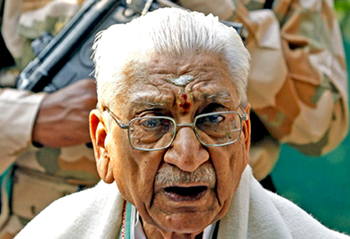New Delhi, Mar 2: The bloodthirsty arsonists allegedly hired by pro-CAA politicians in the capital of India to target Muslims, did not spare even the house of a Muslim leader of BJP.
Akhtar Raza, the BJP’s minority cell vice-president for the Delhi Northeast district, is now not in a position to share his pain with anyone.
Even the police hadn’t come to his rescue, when the mob raising “Jai Sri Ram” slogans burnt down his house at Bhagirathi Vihar Nalla Road in northeast Delhi last week.
“They were chanting slogans. Around 7pm, they started throwing stones at us. I called for police help. But the police asked me to leave. We managed to flee before they burnt my house and destroyed everything,” Raza, who returned today to witness the destruction, told media persons.
“Those who attacked us were not locals. They were outsiders. They managed to identify and burn down all the 19 houses belonging to Muslims in this lane,” Raza said.
Apart from all the belongings in the house of Raza, the arsonists also have burnt down six vehicles belonging to his family.
Raza is sad that no one from BJP contacted him after the violence even though he has been serving the party and promoting its ideology for past five years. “No party leader contacted me. There was no phone call. There was no relief or special treatment or anything,” Raza said.
Interestingly, Raza is still indentifies himself as a BJP leader. “I belonged to BJP. I may continue in the party,” he said.
The locality remained tense on Sunday too. On Monday, several groups distributed relief materials among people who had queued up to collect them. In front of Raza’s house is a lane from which several bodies of innocent Muslims have been recovered.





Comments
I quite like reading through an article that will make people
think. Also, many thanks for allowing me to comment!
Here is my webpage :: how to save your relationship: http://www.sfsc8.cn/comment/html/index.php?page=1&id=21061
Add new comment